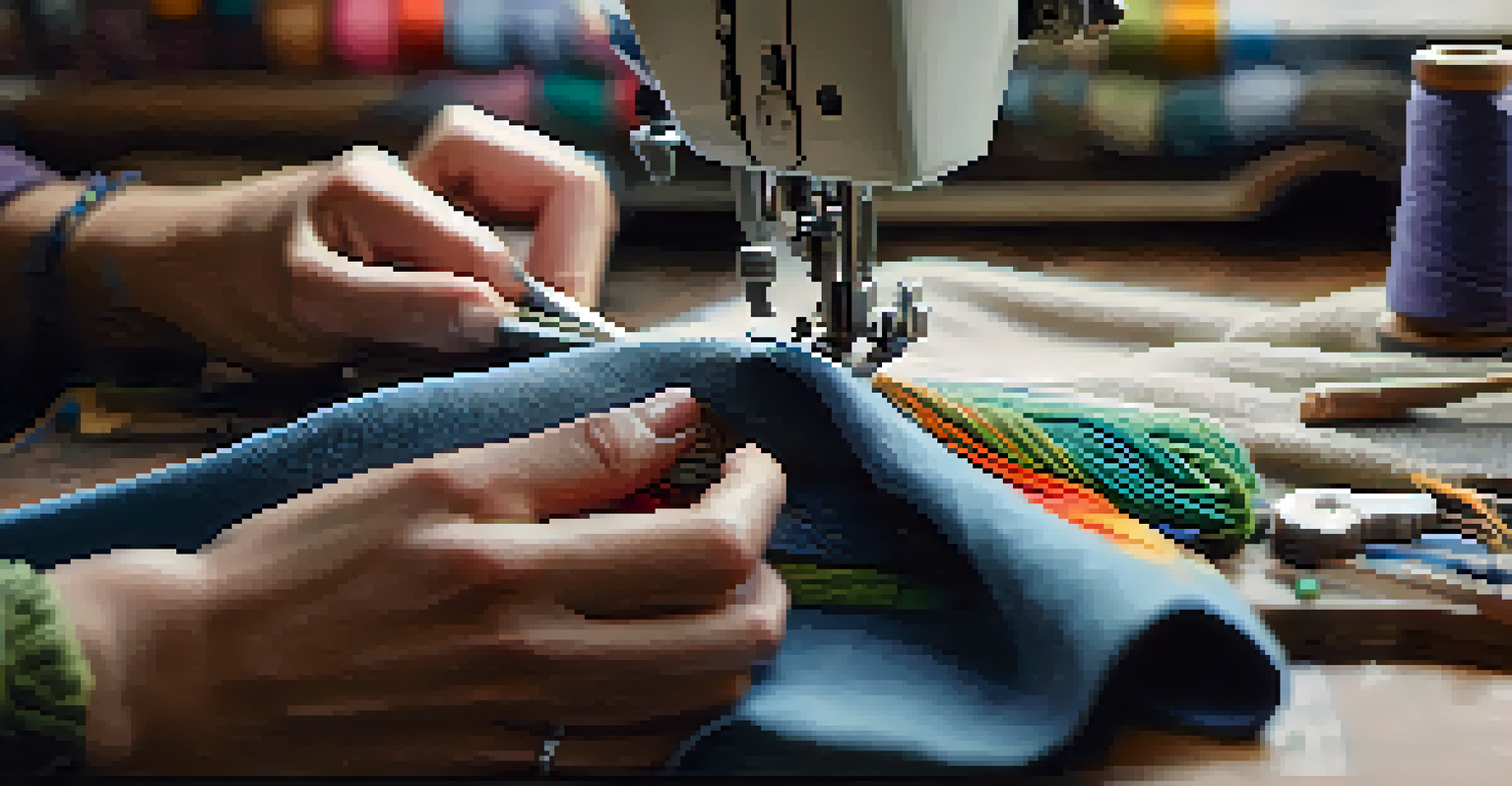The Role of Consumer Education in Sustainable Fashion Trends

What is Sustainable Fashion and Why It Matters
Sustainable fashion refers to clothing, accessories, and footwear that are designed, manufactured, and consumed with mindful consideration of their environmental impact. It prioritizes ethical practices, from sourcing materials to labor conditions. As consumers become more aware of fashion's environmental footprint, the demand for sustainable options grows.
Fashion is like a second skin; it reflects who you are and the values you hold.
The fashion industry is one of the most polluting sectors globally, contributing significantly to waste and carbon emissions. By embracing sustainable fashion, we can help reduce these negative impacts on our planet. Understanding what sustainable fashion entails is the first step toward making informed choices.
In essence, sustainable fashion is about making clothing that lasts, is made from eco-friendly materials, and supports fair labor practices. This shift not only benefits the environment but also promotes a healthier, more ethical economy.
The Importance of Consumer Education in Fashion Choices
Consumer education plays a pivotal role in guiding individuals toward making informed fashion choices. When consumers understand the implications of their purchases, they are more likely to seek out sustainable options. This awareness can lead to a significant shift in the market towards more eco-friendly practices.

Educated consumers can discern between brands that genuinely prioritize sustainability and those that merely engage in 'greenwashing'—a deceptive marketing tactic. By learning to identify transparent and ethical brands, consumers can support businesses committed to sustainable practices.
Sustainable Fashion Benefits Everyone
Sustainable fashion reduces environmental impact and promotes ethical practices, benefiting both the planet and society.
Furthermore, consumer education empowers individuals to consider the lifecycle of their clothing, from production to disposal. This knowledge encourages habits such as repairing, recycling, and buying second-hand, all of which contribute to a more sustainable fashion ecosystem.
How Education Influences Buying Behavior
When consumers are armed with knowledge, their buying behavior changes significantly. Studies have shown that consumers who understand the environmental and social impacts of their purchases are more likely to prioritize sustainability in their shopping habits. This shift can drive demand for sustainable products and encourage brands to adapt their practices.
The future of fashion is sustainable, or there will be no future.
For instance, educational campaigns that highlight the benefits of sustainable fashion can effectively change consumer perceptions. As people recognize the value of investing in quality over quantity, they are more inclined to purchase from brands that align with their values.
Moreover, understanding fashion industry's impact can also prompt consumers to share their knowledge with others, creating a ripple effect. As conversations around sustainability grow, more individuals become aware of the importance of their choices, further influencing market trends.
The Role of Social Media in Consumer Education
Social media platforms have emerged as powerful tools for spreading awareness about sustainable fashion. Influencers and advocates use these channels to educate followers on the importance of eco-friendly practices, showcasing sustainable brands and products. This accessibility allows consumers to learn and engage with sustainable fashion in a relatable way.
Additionally, social media enables brands to communicate their sustainability efforts transparently. When companies share behind-the-scenes content about their production processes, consumers feel more connected and informed. This openness fosters trust and encourages loyalty among eco-conscious shoppers.
Education Drives Sustainable Choices
Consumer education is crucial for guiding individuals toward making informed fashion decisions that prioritize sustainability.
As hashtags like #SustainableFashion and #EcoFriendly gain traction, they create communities of like-minded individuals. These online spaces not only educate but also inspire consumers to share their sustainable journeys, amplifying the message and influencing broader trends within the fashion industry.
Educational Initiatives by Brands and Organizations
Many brands and organizations are recognizing the importance of consumer education and are taking proactive steps to promote it. Initiatives such as workshops, informational videos, and online courses are becoming more common. These resources empower consumers with the knowledge they need to make sustainable choices.
For example, some clothing brands offer guides on how to care for garments to prolong their life, reducing waste. Others may provide insights into their sourcing practices, helping consumers understand the value of ethical production. Such transparency not only educates but also builds trust between brands and consumers.
Furthermore, collaborations between brands and educational institutions can enhance awareness of sustainable practices. By integrating sustainability into fashion curricula, future designers and marketers will be better equipped to drive change within the industry.
Challenges to Effective Consumer Education in Fashion
Despite the progress in consumer education, there are still significant challenges. One major hurdle is the overwhelming amount of information available, which can lead to confusion. Consumers may struggle to discern credible sources from misleading claims, making it harder to make informed choices.
Additionally, the fast-paced nature of fashion can overshadow sustainable practices. Many consumers are drawn to trends that promote quick consumption rather than thoughtful purchasing. This culture can undermine educational efforts aimed at promoting long-term sustainability.
Social Media Amplifies Awareness
Social media plays a key role in educating consumers about sustainable fashion, fostering communities and encouraging eco-friendly practices.
Finally, accessibility is another challenge. Not everyone has equal access to educational resources about sustainable fashion, particularly in underserved communities. Bridging this gap is essential for fostering an inclusive approach to sustainable fashion education.
The Future of Consumer Education in Sustainable Fashion
Looking ahead, the role of consumer education in sustainable fashion will likely continue to evolve. As technology advances, new platforms and tools will emerge to facilitate learning and engagement. Virtual reality experiences, interactive apps, and AI-driven education could revolutionize how consumers access information.
Moreover, as sustainability becomes more integrated into fashion narratives, consumers will expect brands to prioritize education. This shift could lead to more comprehensive marketing strategies that emphasize transparency and accountability, ultimately benefiting the industry as a whole.

In conclusion, the future of sustainable fashion relies heavily on informed consumers. By fostering a culture of education, we can create a more sustainable fashion landscape that values ethical practices and environmental stewardship.